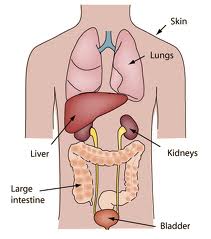Have you ever wondered exactly why you go to the toilet and eliminate that yellow liquid, called urine, out of your body? How do your excretory system actually work? The truth is that most people usually don't know much about their excretory system. Keep reading to learn more about it.
Fun Facts About the Excretory System
You may have the basic information about your excretory system. Do you know the following interesting fun facts about the excretory system that make them special?
1. It's Quite Long
You know your intestines are long, but exactly how long are they? The intestines of an average human can be up to 8.5 meters in length. It equals to 27 feet if you stretch it all out in a single line!
 2. Your Bladder Can Hold a Lot
2. Your Bladder Can Hold a Lot
Your bladder stores urine, which is the waste product expelled after being processed by your kidneys. It contains sugars, salts, proteins and any extra water your body doesn't need. Interestingly, your bladder is spacious enough to hold up to 24 ounces of fluid – it's enough to fill up a couple of standard cans of soda!
3. You Urinate a Lot Every Year
An average person urinates more than 3,000 times a year if your lifestyle doesn't include pushing fluids. It means you may have to go to the bathroom for 5-10 times a day to take a leak. It may take up about 30 seconds to pee, which translates to 1.5-3 minutes per day spent in your bathroom. It also implies that an average person spends up to 18 hours every year doing nothing but urinating.
4. Your Lungs Play a Big Role
Since your lungs help pull in oxygen and remove carbon dioxide, they are also parts of your excretory system. Your lung can be up to 12 inches, but this small organ is a real workhorse. An average person breathes up to 6 million times throughout their life, which also means a lot of carbon dioxide is expelled in the air.
5. Your Digestive System Works Hard
Your digestive system helps process solids and takes out nutrients to fuel your body. The leftovers turn into solid waste. When you put all of it together, it turns out that an average person uses toilet paper to clean up about 305 pounds of waste a year.
6. Your Kidneys Are Extremely Hardworking
One of many fun facts about your excretory system is related to your kidneys which seem never stop working. The largest vein in your body moves through your kidney to clean your blood. In a single day, your blood passes through your kidneys for up to 300 times.
7. More Fun Facts for You
Here are some other interesting fun facts about the excretory system that you may not know:
- Your liver produces up to 6,500 oz. of bile during your lifetime.
- You know your bladder is big, but it can be as big as your brain.
- Your urine can help plants grow because it contains urea, which provides plants with nitrogen.
- Your kidneys are usually equal in size, but your right kidney sits a bit lower as compared to your left kidney.
- Your liver performs so many functions in your body, but it only weighs around 3 pounds.
- You don't feel the urge to pee unless your bladder contains more than 300 mm of urine.
Parts and Functions of Excretory System
You already know some fun facts about the excretory system, but it is also important to understand the functions of different parts of your excretory system.
1. Urinary System
Your urinary system starts with kidneys. Located in the back of your abdominal cavity, the kidneys receive blood supply from renal arteries and excrete urine into the ureters. Kidneys maintain your body's acid-based balance, regulate blood pressure, and regulate electrolytes as well. Urine produced in the kidneys moves to the urinary bladder through the ureters, each of which is about 25-30 cm long. Urine stays in the urinary bladder, which is a hollow yet rather flexible organ. To expel urine out of your body, your urinary bladder connects with your genital through urethra.
2. Lungs
The cells in your body will die in the absence of oxygen, and your lungs help get them the oxygen they need. Carbon dioxide is the waste product of cellular respiration and here again your lungs help expel carbon dioxide from your body through alveoli.
3. Skin
Your skin is also a part of your excretory system because it helps eliminate waste products in the form of sweat, which contains several wastes, such as urea, salt, water and other metabolic wastes. Besides, sweating also helps keep your body temperature low.
4. Large Intestines
Your large intestine is usually of 5 ft. in length and helps transport waste while extracting water. It sometimes takes up to 24 hours for your food to travel to your large intestine.
5. Liver
The liver plays a big role in breaking down chemicals and poisons that would otherwise hurt your body. It takes ammonia and converts it into urea, which your kidneys turn into urine. The liver also produces bile that breaks fat down into usable fats. Your liver is also responsible for maintaining proper levels of glucose in your body.
